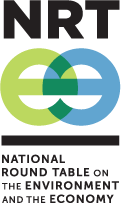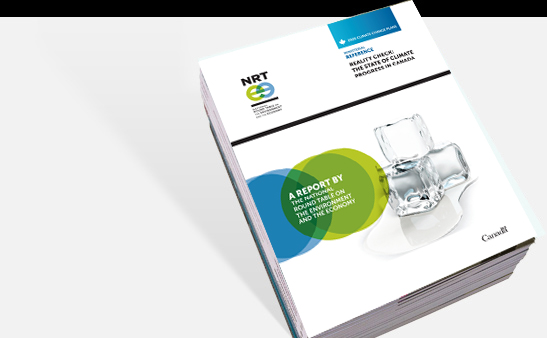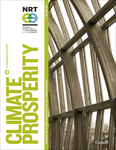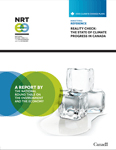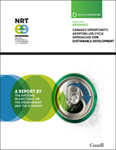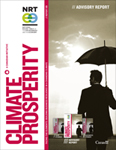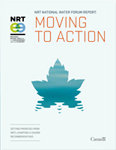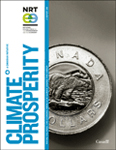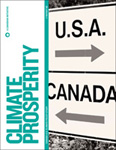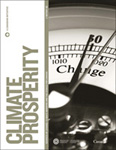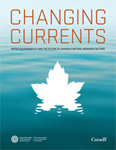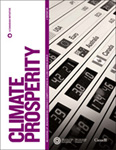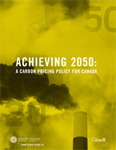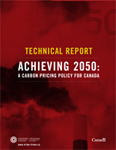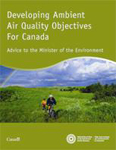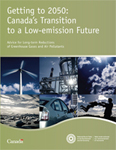Report on Plans and Priorities 2004-2005
NRTEE – 2004-2005 Estimates: Part III – Report on Plans and Priorities
SECTION I: MESSAGE
1.1 Message from the Acting Executive Director and Chief Executive Officer
The National Round Table on the Environment and the Economy (NRTEE) was created in 1994 to provide analysis and advice that would advance the cause of sustainable development. Ten years on, its mission is more relevant than ever, as Canada and governments around the world increasingly accept the need for development that serves both economic and environmental ends.
The NRTEE views the environment through the lens of the economy. It articulates the impact of environmental problems on the Canadian economy, and it assesses how economic policy tools can be used to benefit the environment. By combining a multi-stakeholder approach with robust research and analysis, the agency can produce practical recommendations that promote economic prosperity while preserving the environment for current and future generations.
The NRTEE’s chief role is to assist federal departments, ministers and parliamentarians in their decision making. Two key tools in this regard are its State of the Debate reports and its annual Greening of the Budget submissions. The former reports provide analysis and recommendations from major NRTEE research and consultation programs. The budget submissions, on the other hand, offer information tailored for the use of the Minister of Finance and the House of Commons Standing Committee on Finance. These submissions are the result of intensive analysis and stakeholder consultations throughout the year.
Informed and assertive leadership is vital to achieving environmental and economic goals simultaneously. Accordingly, the agency places a priority on raising awareness and understanding among opinion leaders and decision makers across the country. The NRTEE’s awareness-raising efforts focus on developing regional and national constituencies of support around key issues, support that is essential to generating momentum for change.
The NRTEE takes a strategic approach to its work, selecting three to four issues for examination over a two-year period. The issues must be central to addressing the environmental/economic challenges we face in Canada. They must also be in areas where solutions are best developed through consultation with multiple stakeholders. This approach enables the NRTEE to distill advice and recommendations that government and industry can implement with confidence.
In 2004-2005, the NRTEE will focus on the following four issue areas:
- how fiscal policy can promote the decarbonization of Canadian energy systems, while maintaining options and opportunities for existing energy sources and uses;
- how Canada’s capital markets can better support and stimulate environmentally responsible activities;
- how regulatory and fiscal reforms can enhance natural capital in Canada’s boreal forest; and
- how long-term energy planning for Canada can enhance competitiveness while achieving climate change and other environmental objectives.
The NRTEE will also continue its work in a fifth area in support of its annual Greening of the Budget submission. This work focuses on:
- how the federal government can incorporate significant environmental initiatives into its annual budget.
We are proud in this 10th anniversary year to receive the 2004 Arthur Kroeger College Award for Policy Leadership. This award is given to an individual or organization that serves as a model to others on how to define an issue and successfully advance the policy process through the use of innovative leadership. In the NRTEE’s case, the awards jury noted our efforts in “pursuing policy consensus in the midst of contending economic and environmental perspectives and interests.” We intend to build on our strengths and to continue to provide a valuable service to this country.
___________________________
Eugene Nyberg
Acting Executive Director and Chief
Executive Officer
1.2 Management Representation Statement
I submit, for tabling in Parliament, the 2004-2005 Report on Plans and Priorities (RPP) for the National Round Table on the Environment and the Economy.
This document has been prepared based on the reporting principles and disclosure requirements contained in the Guide to the Preparation of the 2004-2005 Report on Plans and Priorities:
- It accurately portrays the organization’s plans and priorities.
- The planned spending information in this document is consistent with the directions provided in the Minister of Finance’s budget and by TBS.
- It is comprehensive and accurate.
- It is based on sound underlying departmental information and management systems.
The reporting structure on which this document is based has been approved by Treasury Board Ministers and is the basis for accountability for the results achieved with the resources and authorities provided.
______________________________
Eugene Nyberg
Acting Executive Director and Chief
Executive Officer
February 23, 2004
SECTION 2: RAISON D’ÊTRE
Economic growth and prosperity are of central importance to Canadians. However, economic activity is placing increasing pressure on the health of the Canadian and global environments. There is an ongoing need to confront this dilemma by channelling rigorous research, stakeholder views and the resulting new knowledge into policy making.
The NRTEE responds to this need by identifying and promoting ways to encourage economic prosperity for all Canadians, while preserving the environment for current and future generations.
The agency’s contribution corresponds to two of the four themes set out in Canada’s Performance, the President of Treasury Board’s annual report to Parliament. These two themes are (1) economic opportunities and innovation in Canada and (2) the Canadian environment.
SECTION 3: PLANNING OVERVIEW
3.1 Organizational Overview
The NRTEE consists of a membership of distinguished Canadians, supported by a secretariat in Ottawa. Members are appointed to the NRTEE by the Prime Minister and represent a broad range of sectors including business, labour, academia, environmental organizations and First Nations, as well as diverse regions across the country.
The Secretariat, headed by the President and Chief Executive Officer, provides program management, analytical, communications and administrative services to the NRTEE members and their task forces. General information about the NRTEE and its membership can be found on the agency’s Web site (www.nrt-trn.ca/eng/overview/overview_e.htm).
3.2 Planning Context
The NRTEE is an independent agency funded by a vote of Parliament with the authority to collect funds from other sources as well. Operating at arm’s length from government, the agency brings together key stakeholders from government, industry and other sectors on NRTEE task forces to oversee specific programs. These task forces examine critical issues and develop practical solutions to improve policy and decision making with respect to the environment and the economy. The result is targeted policy recommendations that government and industry can implement or react to with confidence.
The NRTEE’s multistakeholder programs also prepare the ground for further debate on contentious issues. They do this by facilitating the development of partnerships across sectors and regions of the country-partnerships that are crucial to breaking down the barriers to sustainable development in Canada.
The NRTEE partners with all levels of government and various national-level stakeholders. Environment Canada, Finance Canada and Natural Resources Canada are its primary federal partners. These departmental partners are also the NRTEE’s clients in that they are often the primary recipients and focus of its work. Municipal, provincial and territorial governments are other key partners, since most environment and economy issues involve all levels of government. Key stakeholder partners range from industry leaders and environmental groups to academia and First Nations.
The agency addresses a number of challenges as it moves beyond providing advice to acting as an agent of change. The most significant is the general lack of understanding of the close links between the environment and economy. The NRTEE is addressing this challenge through a communications effort that focuses on raising the awareness of decision makers and opinion leaders.
Another ongoing challenge for the agency is finding effective ways to incorporate the outcomes of its consultations into policy- and decision-making processes. There is growing acknowledgement that long-term benefits result when the sensitivities and views of stakeholders are well understood and acknowledged.
The NRTEE process of producing new knowledge in a given issue area and validating it through a multistakeholder process requires approximately two years. An exception is the Green Budget Reform program, which is ongoing and submits annual recommendations. In this planning period, the agency expects to complete its current two-year programs and to begin examining a new, as yet undetermined, set of issues.
Within this planning context, the NRTEE has two priorities:
Priority 1: Advise federal decision makers on key environment and economy issues.
Using a multistakeholder approach to balance and validate its advice, the NRTEE is currently examining issues related to:
- enhancing natural capital in the boreal forest;
- ecological fiscal reform and energy; and
- capital markets and corporate responsibility.
The NRTEE is in the early stages of examining a fourth area related to energy and climate change planning for Canada. In addition to advice provided on these issue areas, the agency will deliver recommendations for the annual federal budget.
Priority 2: Raise awareness and understanding of problems, opportunities and practical solutions. This effort is targeted at the federal government and beyond to national-level decision makers in other sectors. In this planning period, the NRTEE will work to raise awareness with regard to previous and new issue areas.
SECTION 4: PLANS AND PRIORITIES BY STRATEGIC OUTCOME
4.1 Strategic Outcome
Decisions throughout Canadian society manifest balanced concern for the environment and the economy. Total planned spending ($ thousands): 5,077
The NRTEE is one of many contributors to policy and decision making in Canada at this level. Consequently, we have decided that it is more feasible and manageable to demonstrate success through the achievement of three intermediate outcomes:
- Federal policy development on environment and economy issues is influenced by advice from the NRTEE;
- Federal clients and national stakeholders are aware of and understand the problems, opportunities and practical solutions identified and examined by the NRTEE; and
- Decisions in other key sectors are informed and influenced by the NRTEE.
The NRTEE’s priorities for this period primarily support the first and second intermediate outcomes; however, the agency’s planned activities will also contribute to the third intermediate outcome.
4.2 Summary
Table 1 – Strategic Outcome, Priorities, Associated Resources and Type
|
Strategic
Outcome
|
Priorities |
Associated
Resources
($ thousands)
|
Type |
|
Decisions throughout Canadian society manifest balanced concern for environment and economy. |
1. Advise federal decision makers on key environment and economy issues. |
3,554 |
Ongoing |
|
2. Raise awareness and understanding of problems, opportunities and practical solutions. |
1,523 |
Ongoing |
|
|
Total planned spending: |
5,077 |
The plans and priorities for fiscal year 2004-2005 reflect two areas of effort that are ongoing and strategic to achieving the NRTEE’s planned outcomes (results). First, the NRTEE seeks to influence decisions at the national level. In particular, it focuses on advising federal clients, because many of its recommendations relate to this sector. Second, the agency has also made improving awareness and understanding a priority, because of the importance of these factors in preparing the ground for informed public debate and the eventual adoption of recommendations.
The next section discusses these two priorities, plans to address them, planned outcomes and how they will be monitored. This section also reviews the NRTEE’s current efforts under modern management.
4.3 Detailed Priorities for 2004-2005
4.3.1 Advise federal decision makers on key environment and economy issues.
The availability of reliable and necessary information is central to good policy and decision making. When the issues lie at the intersection of the environment and the economy, this is a particular challenge, because the information often does not exist. By providing new analysis and recommendations endorsed by stakeholders, the NRTEE supports the decision-making process in government. The new information also supports the work of stakeholders in other sectors of Canada’s economy.
Plans
With respect to its priority to advise federal decision makers, the NRTEE plans to:
- produce analysis and recommendations in five issue areas;
- convene and consult national stakeholders with regard to those five areas; and
- brief senior officials, ministers and parliamentarians on findings in each area.
Produce analysis and recommendations in five issue areas
The NRTEE’s programs often deal with issue areas of emerging importance, where there are significant gaps in existing information and analysis. Consequently, the agency commissions independent research and analysis for each new issue area, which then form the basis for discussion and debate in a multistakeholder consultative process. The work in each program area is eventually consolidated into a State of the Debate report, which reflects the new information, insights and recommendations derived during the research and consultative phases. During the next two years, the NRTEE will produce analysis and recommendations in the following four issue areas:
- Conserving Canada’s Natural Capital: The Boreal Forest
Canada’s boreal forest is considered one of the few remaining areas in Canada where it is still possible to secure our natural capital. A globally significant and largely intact ecosystem, the boreal forest is subject to rapidly mounting pressure as provinces permit development in areas that are as yet untouched and as industrial development moves northward. The challenge is to find a balance between conservation and resource development. The NRTEE will recommend ways in which natural capital in the boreal forest can be enhanced through regulatory and fiscal policy reform. - Ecological Fiscal Reform (EFR) and Energy
An ongoing and important area of NRTEE research is the use of economic instruments to achieve both environmental and economic objectives. The EFR program is currently focusing on energy issues. In particular, it is exploring ways in which fiscal policy can be used to promote the decarbonization of Canadian energy systems, while maintaining and supporting options and opportunities for existing energy sources and uses. This issue, which is of strategic importance to Canada, relates directly to the government’s priority of addressing climate change and clean air, along with the economic opportunities afforded by new energy technologies. Areas being addressed are energy efficiency, hydrogen-based energy and renewable energy. - Capital Markets
Corporate practices and investment decisions can have both positive and negative impacts on the environment. Decisions made within Canada’s capital markets are a tremendous—and as yet largely unexplored—point of leverage for influencing the state of our environment. The NRTEE is currently developing new information, insights and recommendations on how Canadian capital markets could better support and stimulate environmentally responsible activities. - Energy and Climate Change
On August 12, 2003, the Prime Minister asked the NRTEE to “study and inform Canadians on the potential for future emissions reductions.” He stipulated that this work should enrich future energy and climate change strategies and help enhance competitiveness. It should be carried out by examining, among other things, how G8 nations are approaching long-term energy and climate change strategies. The NRTEE is now in the early stages of responding to this request. It is negotiating with the Privy Council Office, Natural Resources Canada and Environment Canada to specify the parameters and timelines of this initiative.
The NRTEE will also work on a fifth issue area, an annual endeavour known as Green Budget Reform.
- Green Budget Reform
By incorporating significant environmental initiatives in its annual budget, the federal government can start to develop a balanced, integrated and sustainable legacy of economic, community and ecological well-being. The result of intensive analysis and stakeholder consultations, the Greening of the Budget submission is presented to the Minister of Finance and House of Commons Standing Committee on Finance each year.
Convene and consult national stakeholders
A fundamental and distinctive feature of the NRTEE’s work is its reliance on the views of national stakeholders. The agency draws on the knowledge of stakeholders through program task forces, broader consultative workshops and quarterly meetings of its own membership. The results of this process form the basis of the NRTEE’s advice to its federal clients.
Program task forces: The NRTEE establishes separate multistakeholder task forces for each issue area examined. A task force is made up of approximately 15 to 20 decision makers, opinion leaders and representatives of the sectors and regions of the country affected by an issue area. In the neutral environment provided by the NRTEE process, task forces guide and examine commissioned research and analysis, debate opposing views and develop widely endorsed recommendations and solutions. They also identify areas and sources of disagreement and their implications for public policy.
Consultative workshops: To support the work of the program task forces, the NRTEE holds consultative workshops attended by a wider range of stakeholders. These consultations provide broad-based and valuable feedback on issues, ideas and approaches under consideration by each program task force.
Membership meetings: Quarterly plenary meetings of NRTEE members, who themselves are key stakeholders from across Canada, provide a forum for discussing issues being examined by the various NRTEE task forces.
Brief senior government officials, ministers and parliamentarians
When a program concludes, the NRTEE distributes State of the Debate reports to policy makers at all levels within government. Importantly, it also provides end-of-project briefings for senior government officials, since this is a highly effective way of reaching key decision makers in the federal government. Briefings are tailored to individual portfolios of responsibility and emphasize the specific information and analysis that deputies, ministers and parliamentarians should consider in policy decisions. In this planning period, the NRTEE will provide briefings on current as well as recently completed NRTEE programs. The Minister of Finance and House of Commons Standing Committee on Finance will also receive our annual Greening of the Budget submission.
Planned results and monitoring for this priority
- A significant body of new knowledge and advice has been validated through national multistakeholder processes in the five areas described above (conserving Canada’s natural capital in the boreal forest; ecological fiscal reform and energy; capital markets; long-term energy planning for Canada; and green budget reform).
- Senior decision makers in the federal system have been briefed on these areas of critical importance to Canadians.
Collectively, these results will contribute to the agency’s first intermediate outcome:
- Federal policy development on environment and economy issues is influenced by advice from the NRTEE.
The agency has a performance measurement strategy in place to (1) monitor the quality of advice provided and (2) ensure that parliamentarians and key government officials are targeted for briefings. Success in achieving the above intermediate outcome will also be indicated when federal decision makers:
- find that the NRTEE’s information helps them understand issues and potential solutions;
- consider the NRTEE’s analysis and recommendations in developing new policy or programs;
- indicate changes in thinking or action on issues; or
- request examination of other issues.
4.3.2 Raise awareness and understanding of problems, opportunities and practical solutions.
The NRTEE notes a general lack of awareness and understanding of the links between the environment and the economy. Accordingly, one of its priorities is to raise awareness and understanding in this area.
Recognizing the importance of this priority, the NRTEE is allocating a greater proportion of its budget to communications in this planning period. Communications efforts will focus on opinion leaders and key decision makers in Canadian society generally (not just decision makers in government), because their support is crucial for the successful adoption of recommendations. In the longer term, encouraging a broader understanding of the issues prepares the ground for complex societal debates on environmental and economic challenges.
The NRTEE’s appropriation precludes mounting a campaign to educate all Canadians on the issues. However, the agency does reach a wider audience through the media, public events and its highly successful Web site, which provides access to all the NRTEE’s published materials and descriptions of its program activities.
This priority is also reflected in an increased effort to deliver regional information sessions. Such sessions enable the agency to reach a broader community of stakeholders while taking into account differing regional sensitivities and contexts across the country. As well, these sessions help to develop the necessary regional constituencies of understanding and support around key issues examined by the NRTEE. Based on the success of regional sessions on urban issues, the NRTEE plans to use this approach with selected programs as they reach completion in this planning period.
The NRTEE will also continue to raise awareness and understanding through other means. These include distributing reports, newsletters and electronic briefings to decision makers and opinion leaders across Canada, carrying out speaking engagements and hosting national events on key issues. The agency will also continue to provide media interviews and produce opinion/editorials for publication in major newspapers, thus leveraging the media to reach and inform Canadians across the nation.
Planned results and monitoring for this priority
- Regional and national information sessions are held and speeches are delivered.
- E-briefs and quarterly newsletters are distributed.
- Media briefings are held and materials distributed.
- Original research, analysis and reports are available on the NRTEE’s Web site.
Collectively, these results will contribute to the agency’s second intermediate outcome:
- Federal clients and national stakeholders are aware of and understand the problems, opportunities and practical solutions identified and examined by the NRTEE.
The agency monitors its communications activities to ensure new knowledge reaches targeted leaders. Achievement of this intermediate outcome will also be indicated when national stakeholders:
- indicate an increase in their awareness and understanding of the issues; and
- indicate that new knowledge will assist them in raising awareness and understanding in their communities and constituencies.
4.4 Modern Management
The NRTEE strives for excellence in its management practices. In this planning period, the agency will strengthen seven elements of management accountability:
- Performance measurement: Continue to lead a joint performance measurement project, involving the Canadian Transportation Agency and the Canadian Environmental Assessment Agency, that will result in tools and lessons to assist the community of small federal agencies and departments. This work will culminate in a workshop for 65 small agencies in 2004.
- Evaluation: Complete an evaluation framework and pilot an element of evaluation each year in this period. It is expected that the NRTEE will play a leadership role in addressing the challenge of evaluation in the small agency community.
- Integrated risk management:Finalize a corporate risk management profile and management strategy in the first year of this period.
- Values and ethics: Produce a formal statement and guidelines for the benefit of staff and members in the first year of this period.
- Costing system: Restructure the activity-based costing system to provide information on intermediate outcomes in support of performance reporting in the first year of this period.
- Information management: Develop and implement an electronic records and information management system in the first year of this period, including a staff training program, in response to the Government of Canada’s Framework for the Management of Information; and
- PAA and EMIS: Comply with Treasury Board Secretariat (TBS) in its new approach to expenditure management, through the Program Activity Architecture (PAA) and the Expenditure Management Information System (EMIS).
SECTION 5: ORGANIZATION
5.1 Accountability
The Prime Minister of Canada is the minister responsible for the National Round Table on the Environment and the Economy.
The President and Chief Executive Officer is responsible for the NRTEE’s single business line, including total gross planned spending of $5.1 million and the 29 full-time equivalents associated with this business line.
5.2 Departmental Planned Spending
Table 2 on the following page summarizes the NRTEE’s total forecast spending for 2004-2005, as well as total planned spending for the next three years. This table also identifies the planned full-time equivalent levels over the planning period. Table 3 summarizes the net cost of the NRTEE’s programs for 2004-2005.
Table 2: Agency Planned Spending
|
($Thousands) |
Forecast Spending 2003-2004 |
Planned Spending 2004-2005 |
Planned Spending 2005-2006 |
Planned Spending 2006-2007 |
|
Total Main Estimates |
5,015 |
5,077 |
5,077 |
5,077 |
|
Adjustments: |
|
|
|
|
|
(93) | – | – | – |
|
170 | – | – | – |
|
33 |
– |
– |
– |
| 110 | – | – | – | |
|
5 | – | – | – |
|
Net Planned Spending |
5,240 |
5,015 |
5,015 |
5,015 |
|
Less: Non-respendable Revenue(2) |
(20) |
(20) |
(20) |
(20) |
|
Plus: Costs of services received without charge3 |
343 |
343 |
343 |
343 |
|
Net Cost of Program |
5,563 |
5,400 |
5,400 |
5,400 |
|
Full-Time Equivalents |
29 |
29 |
29 |
29 |
(1) Reflects best forecast of total planned spending to the end of the fiscal year and includes approvals obtained since the Main Estimates, Supplementary Estimates and any other adjustments.
(2) During 1996-1997, the NRTEE commenced cost-recovery for the organization’s publications. Under the NRTEE Act and Section 29.1 of the Financial Administration , the NRTEE has authority to spend any revenues Actreceived.
(3) The estimated costs of services provided by other departments consist of:
|
($ 000) |
|
|
Accommodation received without charge from Public Works and Government Services Canada |
303 |
|
Pay and benefit services received without charge from Environment Canada |
2 |
|
Audit services received without charge from the Office of the Auditor General |
38 |
|
343 |
Table 3: Net Cost of Program for the Estimates Year 2003-2004
| ($ thousands) | |
| Net Planned Spending (total Main Estimates plus adjustments as per the Planned Spending table) | 5,077 |
| Plus: Services Received without Charge | |
| Accommodation provided by Public Works and Government Services Canada (PWGSC) | 303 |
| Pay and benefit services provided by Environment Canada (EC) | 2 |
| Audit services provided by the Office of the Auditor General (OAG) | 38 |
| 343 | |
| Less: Non-respendable Revenue | 20 |
| 2004–2005 Net cost of Program | 5,400 |
5.3 Office Contact
Mr. Eugene Nyberg
Acting Executive Director and
Chief Executive Officer
344 Slater Street
Ottawa, Ontario
K1R 7Y3
Telephone:
(613) 995-7581
E-mail: nybergg@nrt-trn.ca
